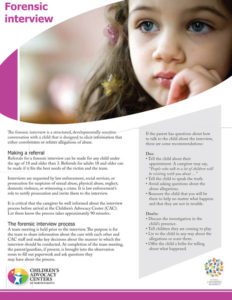A Structured and Developmentally Sensitive Conversation with a Child
It is designed to elicit information that either corroborates or refutes allegations of abuse. This allows a child to tell their story in a safe, child friendly facility by someone who is trained in developmentally appropriate questioning, as well as forensics, so the interview will be admissible in court. All investigative parties participate in the interview via closed circuit television so that the child only has to tell their story of abuse one time.


Forensic Interview FAQs
Give your child enough notice so that they do not feel it is a surprise to them, but also do not give them too long a time period to worry about what they may have to do. Usually, a day or two is enough time for them to feel comfortable with this appointment.
Tell them that you honestly do not know exactly what will be asked, but all they have to do is be honest. Reassure your child that the person they are talking to is very friendly, and wants them to feel comfortable. If at any point your child wants to stop the interview, they just have to say so. It is important to give your child permission to talk about what they have disclosed. Do not tell your child what to say.
Tell your child that you might not know what questions to ask and how to ask them. And also tell them that because you love them so much, sometimes parents ask the kinds of questions that are about feelings instead of about the facts, which is why this special interviewer needs to do the asking. Assure them that they are not in any trouble and remind them how brave they are for letting someone know that someone else has done something wrong.
Be honest with your child; let them know that they will be in the interview room only with the interviewer who works with children and teens. You can let your child know that while they are talking, you are going to be meeting with someone who works at The Children’s Advocacy Center to get information on helping to keep them safe.
Tell your child that you understand their feelings of frustration, especially since it is a difficult thing to talk about. But also tell them how brave they were for telling in the first place and how proud you are of their honesty and bravery. Remind them since they were so brave, they are going to be helping keep other children safe by telling the adults who are in charge of keeping all children safe.
How You Can Help Your Child
Abuse can be overwhelming to children. Most children are taught to trust adults. An overwhelming majority of abuse occurs by someone known and trusted by the child and family. They tend to believe what adults tell them is true rather than rely on their own feelings.
If the offender tells them that what is being done is okay, they may doubt their own feelings that it is not. If the non-offending caregiver’s initial reaction when they hear the child’s abuse report is “This can’t be true,” the child may wonder if his or her own feelings are mistaken. Children rarely lie about being abused. More often they fear that telling will make people angry with them. It is extremely difficult for children to report abuse.
It is important to provide your child with safety, love and support. Let him or her know it is okay to cry or be angry. It is important for your child to know that the abuse was not their fault. Some children are concerned about how the disclosure will affect their family and loved ones, so it is important to be supportive.
Adapted from: When Your Child Has Been Molested by Kathryn B. Hagan
Disclosure can be overwhelming and scary for children, so it is best not to ask a lot of questions. Let your child know that if they need to talk, that you will be there to listen and answer any of their questions.
The chances of recovery for your child are much greater if you do all you can to support them. If you feel torn between loyalty to your child and loyalty to the offender, find a professional to help you sort out those feelings.
The single most important factor affecting the child’s recovery is the level of support from the non-offending caregiver.
The parent is the child’s best advocate, so do not hesitate
to ask questions of your team.
What You Can Say
- I believe you.
- It’s not your fault.
- I’m glad you told me.
- I’m sorry this happened to you.
- I will take care of you.
- Nothing about YOU made this happen.
- I am upset, but not with you.
- I’m sad too. You may see me cry. That’s all right. I will be able to to take care of you. You don’t need to take care of me.
- You can still love someone but hate what they did to you.
- I am proud of you.
What You Can Do
- Return to a normal routine as soon as possible. Children often find comfort in the predictability that a routine offers.
- Ensure that your child is assessed and receives appropriate counseling services. Find help for yourself.
- You don’t have to do it all on your own.
- Teach your child the rules of personal safety. Tell them what to do if someone tries to touch them or treat them in an uncomfortable or hurtful way.
- Be careful not to question your child about the abuse. If your child wants to talk about it, listen supportively, but do not probe. Specially trained professionals at the CAC will interview your child to obtain the necessary information without harming the case or further traumatizing him/her.
- Keep yourself and your child away from the person suspected of the abuse. This is to protect your child’s welfare, yourself and that person.
- Avoid discussing the case with other victims or the families.
- Never coach or advise your child on how to act or what to say to professionals or investigators.
- Your child may need an extra sense of physical security. Stay close, and assure your child you will keep him/her safe.
- Remember to give attention to your other children.
- Follow the recommendations from your team at the CAC. They are specially trained in working with abuse and will be able to offer recommendations specific to your family and case.

